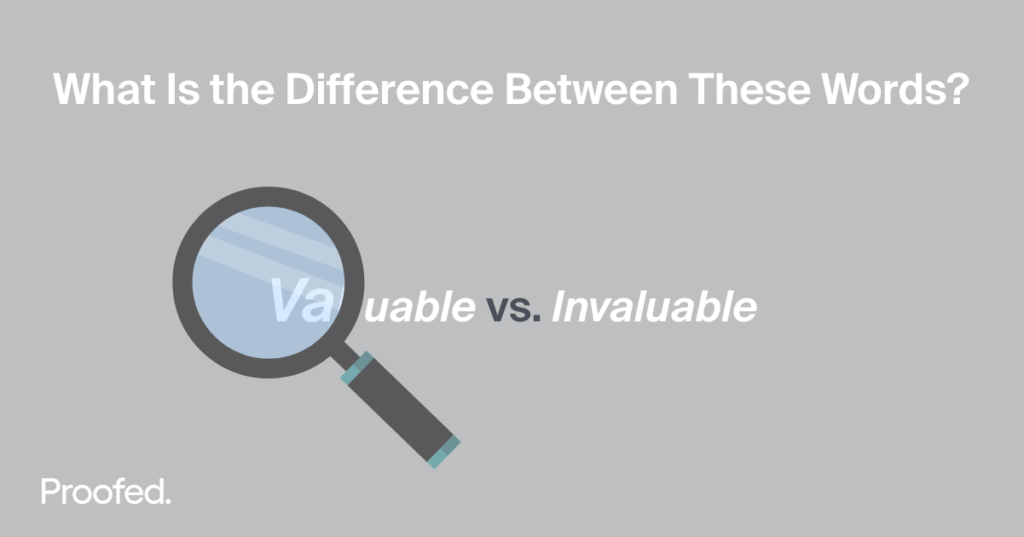“Valuable” and “invaluable” are tricky words. They look like opposites, but there’s actually a big overlap in their meanings. So, what is the difference between something being “valuable” and something being “invaluable”?
In this post, we’ll help you make the right choices in your writing.
Valuable (Worth a Lot of Money or Important)
The word “valuable” is usually an adjective meaning “worth a lot of money”:
They kept the most valuable jewelry in a safe.
He is very valuable to us as a client.
Or it can describe something as being important more generally:
Anna gave me some valuable advice.
The most valuable things in my life are friends and family.
More rarely, “valuable” can be a noun that refers to something of value. For instance, people use the plural “valuables” to refer to small, valuable items:
I locked my camera, passport, and other valuables in the hotel safe.
In all cases, though, “valuable” refers to something having worth.
Invaluable (Priceless or Essential)
The adjective “invaluable” means “priceless” or “essential.” This can apply to something that is beyond monetary value, such as a priceless work of art. More often, though, it applies to something extremely useful or important:
Jean’s travels gave her invaluable insight into other cultures.
Her analytical skills make her an invaluable member of the team.
Find this useful?
Subscribe to our newsletter and get writing tips from our editors straight to your inbox.
In this sense, we can sometimes use “valuable” and “invaluable” interchangeably, such as in our earlier example:
Anna gave me some invaluable advice.
The only difference here is that “invaluable” is stronger than “valuable.”
But this doesn’t work for things that are simply worth a lot of money:
The Rolex watch is more invaluable than the Casio watch. ✘
The Rolex watch is more valuable than the Casio watch. ✔
And, unlike “valuable,” “invaluable” is only ever an adjective, never a noun.
But what about the “in-” at the start of “invaluable”? Doesn’t this usually imply a negation, such as “inedible” (the opposite of “edible”) or “incorrect” (the opposite of “correct”)? Well, yes! But “invaluable” doesn’t mean “not valuable.” Instead, it means “too important to have a mere monetary value.”
Thus, “invaluable” is the opposite of “valuable” insofar as something “invaluable” is “not able to be valued.” But it doesn’t mean “not of value”!
Summary: Valuable or Invaluable?
These words can be confusing, but remember:
- Valuable is usually an adjective meaning “worth a lot of money” or “important.” In addition, people often use the plural noun “valuables” to refer to small items of high value, such as jewelry.
- Invaluable is always an adjective and means “priceless” or “essential.”
When using these words, keep in mind that “invaluable” doesn’t just mean “worth a lot of money.” Thus, you should only use “invaluable” when something is priceless or essential, not just “valuable” in a monetary sense.
And if you’d like any more assistance with your word choices, or any other aspect of your writing, our expert editors are here to help. Why not give our free proofreading trial offer a try today to find out more?
